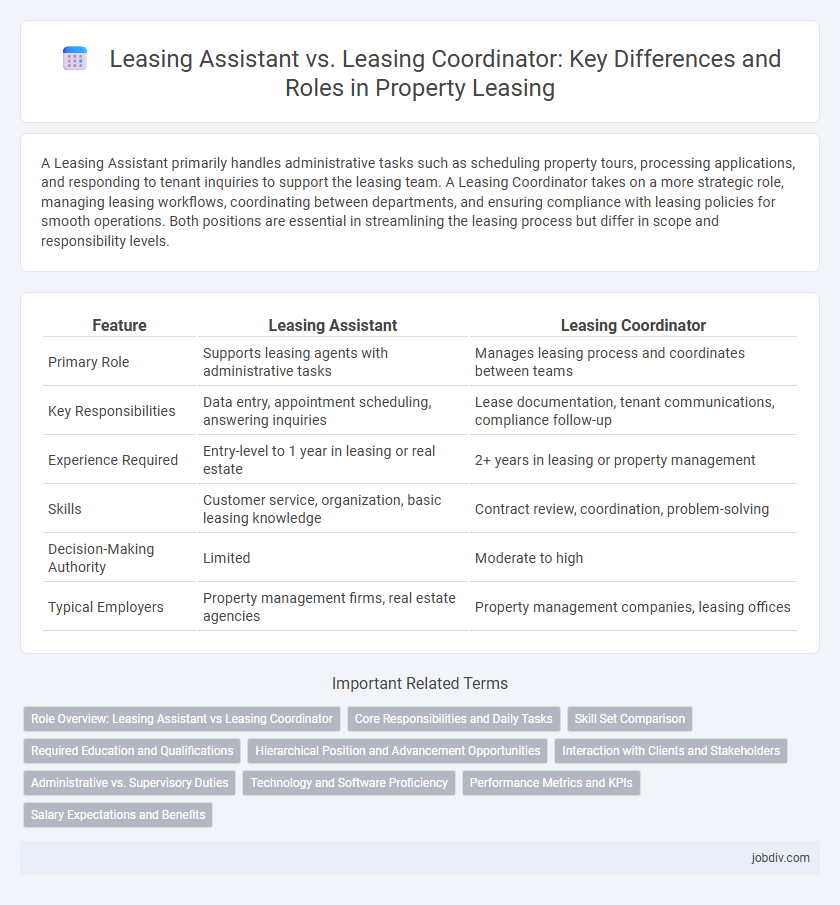A Leasing Assistant primarily handles administrative tasks such as scheduling property tours, processing applications, and responding to tenant inquiries to support the leasing team. A Leasing Coordinator takes on a more strategic role, managing leasing workflows, coordinating between departments, and ensuring compliance with leasing policies for smooth operations. Both positions are essential in streamlining the leasing process but differ in scope and responsibility levels.
Table of Comparison
| Feature | Leasing Assistant | Leasing Coordinator |
|---|---|---|
| Primary Role | Supports leasing agents with administrative tasks | Manages leasing process and coordinates between teams |
| Key Responsibilities | Data entry, appointment scheduling, answering inquiries | Lease documentation, tenant communications, compliance follow-up |
| Experience Required | Entry-level to 1 year in leasing or real estate | 2+ years in leasing or property management |
| Skills | Customer service, organization, basic leasing knowledge | Contract review, coordination, problem-solving |
| Decision-Making Authority | Limited | Moderate to high |
| Typical Employers | Property management firms, real estate agencies | Property management companies, leasing offices |
Role Overview: Leasing Assistant vs Leasing Coordinator
A Leasing Assistant primarily handles administrative support tasks such as processing applications, scheduling property showings, and maintaining tenant records to ensure smooth leasing operations. In contrast, a Leasing Coordinator manages communication between leasing agents and clients, oversees lease documentation, and coordinates lease renewals and compliance matters. Both roles contribute to efficient property management but differ in scope, with Coordinators focusing more on coordination and operational oversight.
Core Responsibilities and Daily Tasks
A Leasing Assistant primarily supports leasing agents by handling customer inquiries, scheduling property tours, and preparing leasing documents, ensuring smooth tenant onboarding. Leasing Coordinators oversee lease administration, track lease expirations, coordinate renewals, and manage communication between tenants and property management teams. Both roles require strong organizational skills, but Leasing Coordinators focus more on lease lifecycle management while Leasing Assistants provide frontline leasing support.
Skill Set Comparison
Leasing Assistants typically excel in customer service, communication, and basic administrative tasks such as scheduling tours and processing applications. Leasing Coordinators require advanced organizational skills, proficiency in lease documentation, and experience in coordinating between various departments to ensure lease compliance and smooth transaction flow. Both roles demand knowledge of property management software and strong interpersonal abilities but differ in complexity and scope of responsibilities.
Required Education and Qualifications
Leasing Assistants typically require a high school diploma or equivalent, with some employers preferring candidates who have completed post-secondary courses in real estate or business. Leasing Coordinators generally need an associate's or bachelor's degree in real estate, business administration, or a related field, reflecting a higher level of education and expertise. Both roles demand strong communication skills, but Leasing Coordinators often require experience in property management and familiarity with leasing laws and software systems.
Hierarchical Position and Advancement Opportunities
A Leasing Coordinator typically holds a higher hierarchical position than a Leasing Assistant, overseeing multiple leasing assistants and managing more complex administrative tasks. Leasing Assistants focus on support duties such as responding to initial tenant inquiries and scheduling tours, while Leasing Coordinators handle lease documentation, tenant relations, and coordinate leasing activities. Advancement opportunities often lead from Assistant roles to Coordinator positions, with potential growth into Leasing Manager or Property Manager roles.
Interaction with Clients and Stakeholders
Leasing Assistants primarily handle direct communication with prospective tenants, scheduling property tours, and responding to initial inquiries to ensure a seamless client experience. Leasing Coordinators engage more extensively with internal stakeholders such as property managers, maintenance teams, and legal departments to align leasing processes and resolve complex client issues. Both roles require strong interpersonal skills, but Leasing Coordinators typically manage higher-level interactions and coordination to support overall leasing operations.
Administrative vs. Supervisory Duties
Leasing Assistants primarily handle administrative tasks such as processing applications, scheduling appointments, and maintaining leasing records to ensure smooth day-to-day operations. Leasing Coordinators oversee these activities while managing team schedules, training staff, and ensuring compliance with leasing policies, reflecting their supervisory role. The distinction lies in Leasing Assistants focusing on execution of leasing processes, whereas Leasing Coordinators emphasize management and coordination of leasing personnel and procedures.
Technology and Software Proficiency
Leasing Assistants typically utilize property management software such as Yardi or AppFolio for tenant applications and lease documentation, focusing on data entry and customer communication tools. Leasing Coordinators often require advanced proficiency in CRM platforms, automated leasing workflows, and reporting software to streamline lease processing and ensure compliance. Both roles depend heavily on technology, but Leasing Coordinators demand a higher level of technical skill for managing integrated leasing systems and analytics.
Performance Metrics and KPIs
Leasing Assistants are primarily evaluated on customer interaction metrics such as response time, appointment scheduling accuracy, and tenant inquiry resolution rates. Leasing Coordinators focus on broader performance indicators including lease agreement processing speed, compliance adherence, and coordination efficiency between leasing teams and maintenance departments. Key KPIs for both roles include lease conversion rates, tenant retention statistics, and overall contribution to occupancy targets.
Salary Expectations and Benefits
Leasing Assistants typically earn an average salary range of $33,000 to $42,000 annually, while Leasing Coordinators can expect higher compensation, often between $45,000 and $55,000 per year, reflecting greater responsibilities. Benefits for both positions frequently include health insurance, retirement plans, and paid time off, but Leasing Coordinators may receive additional perks such as performance bonuses and professional development opportunities. Salary and benefits packages vary based on location, company size, and experience level, influencing overall compensation competitiveness in the leasing sector.
Leasing Assistant vs Leasing Coordinator Infographic

 jobdiv.com
jobdiv.com